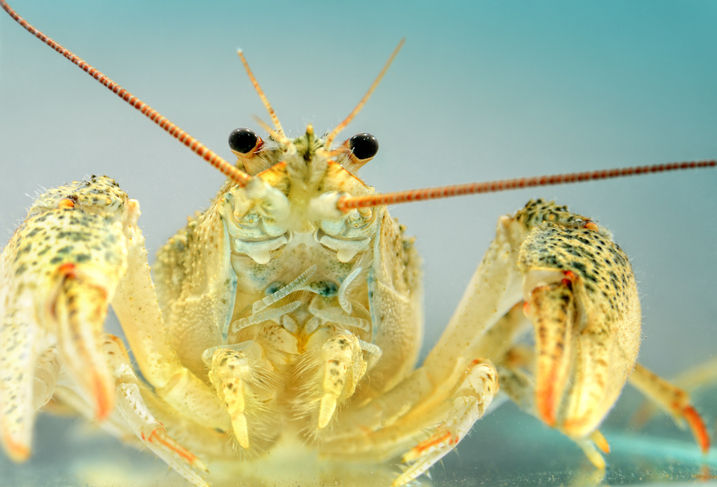Hit and miss for decapod welfare at industry conferences
- Crustacean Compassion

- May 31, 2024
- 3 min read
Seafood industry innovation was on the agenda at two conferences in London this month, although the results were varied for decapod crustacean welfare.
Innovators, investors and thought leaders gathered for the Blue Food Innovation Summit where sustainability was the big topic up for discussion. However, despite the inclusion of one session on animal health and welfare during the two-day event, the elephant in the room is the continuing inhumane treatment of billions of sentient aquatic animals in the food industry, such as decapod crustaceans was ignored.
Panellists and speakers repeatedly acknowledged the industry’s heavy reliance on social licence to operate, stressing that seafood producers, processors and retailers had to win (and retain) the public’s trust to secure a future as a thriving, sustainable food system. As is so often the case at seafood industry events, the need to tell a good sea or farm-to-plate story was frequently referenced, along with a desire to improve the cultural relevance of fish and shellfish with consumers especially younger consumers.
Collaboration, partnership, storytelling and pre-competitive problem solving seemed to be the buzzwords of the conference. We would certainly back the call for the industry to work together to solve decapod welfare issues. From the wider adoption of electrical stunning to the elimination of live tailing of nephrops, common working practices used to handle and slaughter decapods are clearly inhumane and need to be revised urgently. Some work has already begun within the industry to tackle some of these challenges (more on that shortly) and, as panellists acknowledged, the responsibility to do that vital work lies squarely on the shoulders of the seafood industry.
The conversation on animal welfare touched on issues such as mortality rates being used as welfare indicators, rightly highlighting that there were many opportunities to monitor welfare and intervene before an animal became so ill, injured or distressed that it died. Panellists also pointed out that innovative technology and practices can only bring about meaningful change if top management has genuinely bought into the process.
It was disheartening to see speakers shy away from discussing the choices still being made to continue inhumane practices in the capture, handling, storage, transportation and slaughter of decapods when research released that day shows that animal welfare still more important than sustainability. If you really want to attract younger consumers, then listen to what they are telling you and it's that they want higher welfare. We urge conference organisers and delegates to push welfare to the top of the agenda next year and face those difficult questions. After all, it’s impossible to tell a good story in which sentient animals are not treated with care and respect.
The following week, at the Shellfish Association of Great Britain (SAGB) annual conference, Seafish gave a long-awaited update on progress of the industry-led Codes of Practice for decapod welfare, which were originally expected at the end of 2023. Now due for release in July, we hope the Codes will demonstrate a welfare-first approach that supports businesses in understanding and implementing the highest possible welfare standards.
On the final day of the conference, it was good to hear an encouraging update on the progress of a nephrops welfare project led by a coalition of companies and organisations including Marks & Spencer, Associated Seafoods, Whitby Seafoods, Young’s, Seafish, Macduff Shellfish, Optimar and Fisheries Innovation and Sustainability. The group are confident they now have proof of concept for a humane electrical stunning and automatic detailing machine for nephrops on vessels at sea. It is hoped the prototype will be ready by the end of the year. Along with improving animal welfare and working conditions, and cutting crew numbers, an economic analysis by Seafish found the technology could help to reduce costs and boost efficiency. Funding for the next stage and fishing vessels that are willing to trial the innovation are now being sought.
It felt like this conference was listening to their audience and not avoiding the difficult truth, which is that whilst farming on land has progressed with more rigorous welfare policies, unfortunately the fishing industry has not. It was great to see industry actors encouraging each other to pool their resources and talent to tackle this issue and secure a better future for decapods, consumers and businesses alike.
Next month, our corporate engagement advisor Jane Bush will be taking part in a discussion panel at Oceanovation Live, an investor and innovation-focused seafood event in The Hague. Alongside Ace Aquatec and Aquatic Life Institute, Jane will be discussing the opportunities open to investors who want to support the innovation required to improve decapod welfare. Find out more about the event here and do come along to our event at 3pm on Wednesday 19th June.





